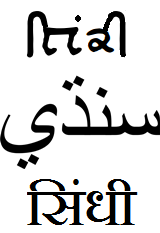Language/Sindhi/Grammar/Comparatives-and-Superlatives
Comparatives and Superlatives in Sindhi
In this lesson, you will learn how to form comparative and superlative sentences in Sindhi, for comparing people, objects, or situations. Comparatives and superlatives are used to express the degree of difference or similarity between two or more things.
Comparative Form
To form the comparative form of an adjective or adverb in Sindhi, we use the suffix -تر (-tar).
For example:
| Sindhi | Pronunciation | English |
|---|---|---|
| ٽڪدوس | Template:IPA | faster |
| موٽر | Template:IPA | bigger |
| هلڪ | Template:IPA | easier |
Note: In Sindhi, as in many other languages, adjectives agree in gender and number with the noun they modify. However, this lesson will not cover gender and number agreement in adjectives at this time.
To compare two nouns using an adjective or adverb, we add the comparative suffix -تر (-tar) to the adjective or adverb, and use the word جيئن (jeyn) which means "than" to make the comparison. The first noun is followed by جيئن (jeyn), and the second noun comes at the end of the sentence. The word order is thus:
Noun A + adjective/adverb in comparative form + جيئن (jeyn) + Noun B
For example:
- توڙجيئن ٽڪدوس هلي ٿو The car goes faster than the bike.
- وزيرئين پاڻي جي طرح ڳوٺ بهاغي The garden is as big as the minister's house.
- هن جبرجن کي سڌهن جيئن سمجھ سگھجن This language is easier to learn than that one.
Note: Sindhi has a unique plural form for nouns. Instead of adding "s" like in English, Sindhi adds the suffix "ن" to the singular form of the noun. However, in this lesson, we will use the singular form of the noun for simplicity.
Superlative Form
To form the superlative form of an adjective or adverb in Sindhi, we use the suffix -ڏهيڻ (-dehin).
For example:
| Sindhi | Pronunciation | English |
|---|---|---|
| هٽ | Template:IPA | hottest |
| ڏٺ | Template:IPA | smallest |
| سڄو | Template:IPA | straightest |
Superlative form is used to show highest or lowest degree.
To form the superlative form of an adjective or adverb in Sindhi, we add the suffix -ڏهيڻ (-dehin) to the adjective or adverb, and use the word جيڪڏهن (jikdehin) which means "the most" or "the least" to make the comparison. The noun comes at the end of the sentence. The word order is thus:
Adjective/adverb in superlative form + جيڪڏهن (jikdehin) + Noun
For example:
- اهڙي ڳاله گٺڻ سان جو ڏهيڻ جيڪڏهن Hurry up and finish this work as soon as possible.
- چورون ٻڌجن کي ڏٺ ڏهيڻ جيڪڏهن Ash trees are the smallest.
- سڄوگھوڙي سڑڪي ڪان ڳاله هلي The horse ran the straightest on this road.
Irregular Comparatives and Superlatives
In Sindhi as well as in other languages, there are some adjectives and adverbs that have irregular comparative and superlative forms.
Here are some examples:
| Positive | Comparative | Superlative | ||||||||||||
|---|---|---|---|---|---|---|---|---|---|---|---|---|---|---|
| نور | نروتر (norotar) | نور جو ڏهن (nor jo dehin) | هلڪ | هلڪتر (hilkatar) | هلڪڻ جو ڏهن (hilkun jo dehin) | پاڻ | پڻيتر (pəɽ-it̪ar) | پاڻي جو ڏهن (pəɽ-i jo dehin) | روٺ | رتڙوتر (rut̪ʂot̪ar) | روٺ جو ڏهن (rut̪ʂo jo dehin) | سرڻ | سڻيتر (səɽ-it̪ar) | سرڻي جو ڏهن (səɽ-i jo dehin) |
These words are often used in comparison with other words as they describe specific qualities or attributes of things.
Practice Exercises
Exercise 1
Using the appropriate form of the adjective or adverb in Sindhi, complete the sentences with the correct comparative or superlative form. (Hint: You may need to refer to the vocabulary lists of previous lessons.)
- Andaaz سان ڊاڪٽرون سڀاڻاਃ ڊاڪٽران هلي ٿاڻ
- پر گهوڙو جي ٻڙن سان هٽ گهوڙي جي ٻڙن سمجھو.
- شفافي ۽ وضاحت جيڪڏهن جو ڏهيڻ پاڻي سان هجڻي
- عتيقجو ڳاله محمد جو ڳالو سان تيز ٺاهي.
- تون ۾ هو مناسب سان هلي ٿو۔
- وڄي نهيڻ جو ڏهن انگريزي کتاب سان پروفيسر حسين جو کتاب ، ٻاپ سان.
- سٺڻ غڻون جو ڏهيڻ چيپ سان سڏو جڏهنڪي
Exercise 2
Translate the following sentences into Sindhi:
- The Nile is longer than the Amazon.
- China is more populous than Russia.
- Cheese is more expensive than bread.
- Pakistan is hotter than Canada.
- Dark chocolate is healthier than milk chocolate.
- Mount Everest is the highest peak in the world.
- Iron is stronger than wood.
Conclusion
Comparatives and superlatives are important concepts in any language, as they allow us to express comparisons and degrees of difference or similarity. In Sindhi, the comparative form is formed by adding the suffix -تر (-tar), while the superlative form is formed by adding the suffix -ڏهيڻ (-dehin). Some adjectives and adverbs have irregular forms in comparative and superlative. In Sindhi, adjectives and adverbs agree in gender and number with the noun they modify.

